


 Chapter I The Blitzkrieg in the Low Countries
Chapter I The Blitzkrieg in the Low Countries
"THE Germans are bound to attack in the late spring or early summer.They simply cannot wait until we and the British attain superiority in manpower and materials." It is the French Minister at the Hague speaking, theclever and charming Baron de Vitrolles, and the date of my conversationwith him is January 1940. He continues: "Where will the battle be foughtout? There are two traditional battlefields in Europe -- Lombardy andFlanders. The second will be the scene of the big battle of the present war,just as it was of another great war -- Waterloo. The Germans will attack viathe Netherlands and Belgium and the decisive battle of this war will develop somewhere within a radius of fifty miles from Waterloo. It will be a warof movement. And in this kind of warfare we always have been superior tothe Teutons." The Minister's words, except the last sentence, were almostprophetic. They showed that responsible French quarters knew that the attack on their country was bound to come and that it would come via theLow Countries.
Why did France and the Low Countries not do everything in their power toforestall the German move? The answer is a sad one. It is a tragic story oflack of statesmanship in Belgium and the Netherlands, where King Leopold and Queen Wilhelmina refused to conclude an alliance with the Western Powers or to make military arrangements between the respective general staffs. It is a story, moreover, of incompetence, inefficiency and fifthcolumn activities both in the Low Countries and in France.
For two years the Low Countries had been living in constant fear that theirmighty neighbor, Nazi Germany, might launch a sudden attack againstthem and would start its advertised Blitzkrieg against France across theirterritories. Though this fear had existed for a long time, both Belgium andthe Netherlands refused to make alliances or initiate staff talks with theWestern Powers. And though they refused to make arrangements for thecrisis, they expected these two Powers to help them when it came. As farback as the end of March 1939 the world press published alarming reportsof Germany's intention to launch an attack against Switzerland and Holland. All the small neutrals felt it necessary to take certain military precautions. Then in August 1939 the war clouds started to gather in earnest.Again the small countries were compelled to effect precautionary measures. Both Holland and Belgium took for granted that if war should breakout over Danzig, the Western Powers would try to help Poland by movingagainst Germany; whereupon Germany, to counteract this move, wouldlaunch her motorized divisions into the Low Countries with a view to pushing through into Northern France. Now Belgium had been constructingconsiderable defense works ever since 1931. As the threat of war becamemore imminent she increased the pace. Holland, owing to Socialist andother pacifist influences and a long tradition of neutrality, had considerably neglected her defenses. Yet she also started to develop fortificationsand defense works, coupled with inundation preparations.
When I arrived in Holland in October 1939 there were persistent rumors,based on the concentration of forty Nazi divisions opposite the Low Countries, of an imminent German attack. At the beginning of November the situation became so tense that King Leopold, tipped off by German friends,rushed to The Hague to see Queen Wilhelmina in the hope that the twocountries might avoid an invasion by making a conciliatory offer to Berlinjointly. The meeting of the two rulers took place on November 6. The nextday steel-helmeted police, armed with carbines and revolvers, suddenly appeared around all public buildings in Dutch cities. Today we know that theDutch Nazis had organized a putsch for November 11. But the authoritiesdiscovered the plan in time and arrested many Nazis, among them severalscore officers and soldiers. Furthermore, the head of the British secretservice, Captain Stevens, and his assistant, Sigismund Payne Best, werekidnapped on November 9 by the Gestapo at a Dutch frontier village, Venloo. The next day the German troop concentrations were augmented. Holland mobilized all her forces in readiness to repel what seemed an imminent attack.
While I realized the seriousness of the situation, I was of the opinion atthat time that this German move was partly a measure of intimidation, butthat most of all it was tactical. One of the probable purposes of the Germanfeint seemed to me to find out how Belgium and Holland would act in casea Blitz attack really occurred; but more than that, its purpose was to findout what the French and the British would do.
If this was the aim of the Germans they succeeded in attaining it. In November of last year they knew exactly where and when the Dutch weregoing to flood their territories and what regiments would be rushed where.They knew how quickly the first line of the Dutch defenses could bemanned in a crisis. The same occurred in Belgium. This was the information the Germans needed to enable them to calculate the moves of theirown army so as always to be hours -- or even only a few minutes -- aheadof the respective defensive moves of their opponents.
The Germans also learned through their spies about the movements of theFrench and British troops along the extension of the Maginot Line. Theycame to the conclusion that the French and British could not send help fastenough to Belgium and the Netherlands to be effective if no special arrangements had been concluded in advance between those four countries.They also wanted to find out whether the Allies were going to rush important air forces to Holland. From their knowledge of Allied dispositions inthe November 1939 crisis in the Low Countries the German Staff came tothe conclusion that neither Holland nor Belgium could count on really substantial arial help from Britain, and that almost none would come fromFrance.
Nevertheless, there were factors in both the Dutch and the Belgian defensemoves -- the Belgian especially -- which necessitated certain alterations inthe original Blitzkrieg plans. The Germans noticed that Belgium had beenfeverishly improving her defenses along the Albert Canal. Yet the Germanplan was to launch the first blow at exactly the same spot as in August1914. It was a return to the original Schlieffen Plan, which did not makethe 1914 mistake of leaving out Holland. In 1914 the first Uhlans crossedthe Meuse south of Vis; in 1940 the German motorized divisions crossedthe river north of Vis, only a few miles distant. "On revient toujours sonpremier amour."
But before actually launching their blow the Germans wanted to make afurther rehearsal which would also serve the purpose of attracting the Belgians' attention to a part of their defenses where the Germans had no intention of attacking. For this purpose an "incident" was shrewdly staged.An airplane with two German staff majors landed near the Belgian frontier, allegedly because of lack of gas. In the plane were found the plans ofan impending attack, presumably scheduled for January 13, 1940. According to these plans the Germans contemplated piercing the Belgian defenselines between Andenne and Huy on the Meuse River. The subterfugeworked. The Belgians now started feverishly to fortify their positions inthat sector, diverting their attention from the Lower Meuse and the AlbertCanal where four months later the decisive German attack was actuallylaunched.
Next page
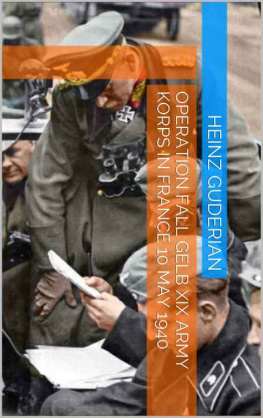
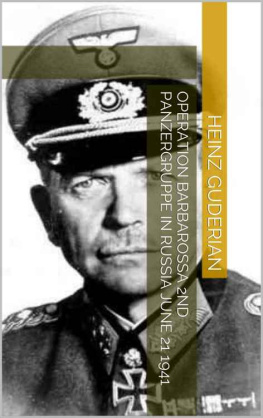


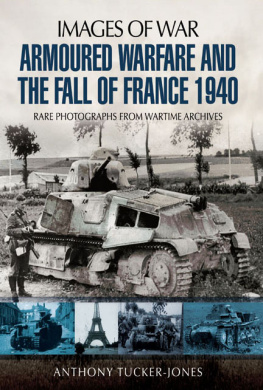

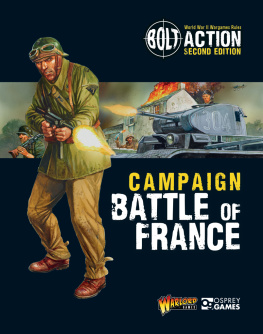
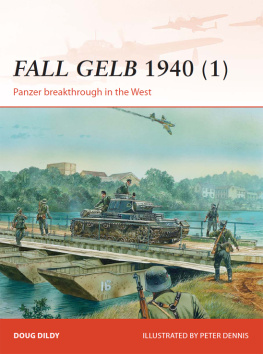
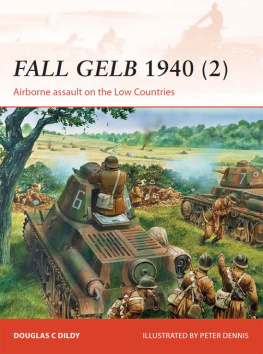



 Chapter I The Blitzkrieg in the Low Countries
Chapter I The Blitzkrieg in the Low Countries